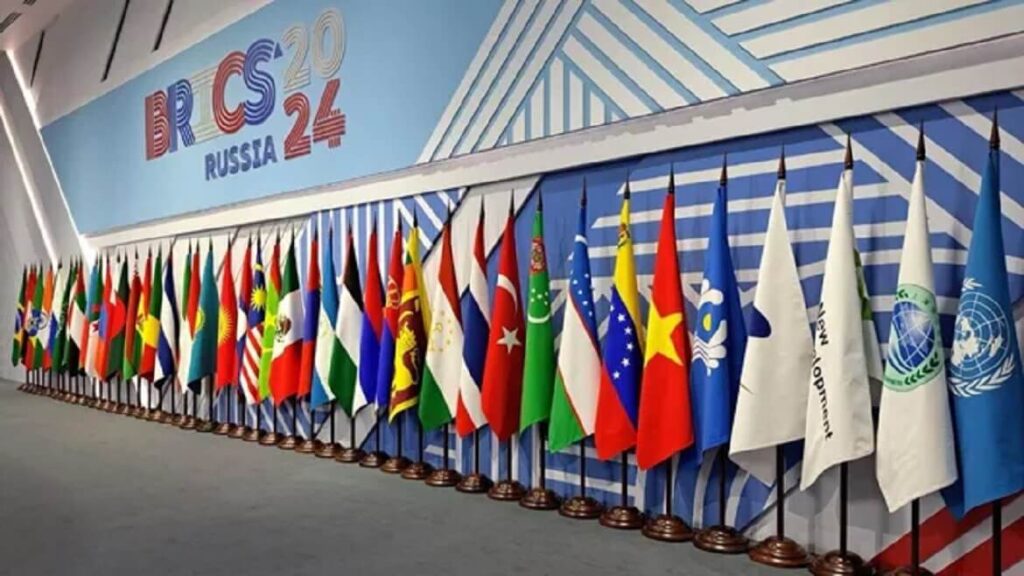By Yasir Masood
As the 16th “BRICS Plus” Summit commenced in Kazan, Russia, on October 22, 2024, the bloc embarked on a pivotal journey to redefine global governance by amplifying the voices of the Global South.

The 16th BRICS Summit is particularly significant as it marks the first gathering since the bloc’s expansion to include Egypt, Ethiopia, Iran, Saudi Arabia, and the United Arab Emirates. With its members now representing regions across Asia, Africa, and Latin America, BRICS accounts for nearly 50% of the world’s population and approximately 30% of global GDP. This broader membership underscores the group’s growing influence in global affairs and strengthens its commitment to creating a more equitable and just multipolar world order.
As a major platform advocating for emerging markets and developing countries, which have driven 80% of global economic growth over the past two decades and increased their share of global GDP from 24% to over 40% in the last 40 years, BRICS has proved its capacity to foster global peace and development.
Key Takeaways from the Summit
One of the most critical outcomes of the summit is BRICS’ commitment to creating alternative financial structures that promote economic independence. Leaders from the bloc have set a target to decrease reliance on the US dollar for global trade, recognizing that 80% of global trade is currently conducted in the dollar. Plans were discussed to enhance the use of national currencies in transactions, with initial estimates suggesting that this could increase trade between BRICS nations by up to 30% within the next five years.
Moreover, discussions around central bank digital currencies (CBDCs) reveal a forward-thinking approach to modernizing financial systems. It was noted that the potential integration of CBDCs could streamline transactions across member countries, reducing costs and increasing transaction speeds by up to 40%. This shift is essential as countries seek to insulate themselves from the vulnerabilities of dollar-dominated financial systems.
The summit also highlighted BRICS’ commitment to sustainable development, with the Shanghai headquartered New Development Bank (NDB) approving around $33 billion in loans for various projects. These investments will focus on green technologies and infrastructure—critical for addressing both economic development and climate change. For instance, $10 billion is earmarked for renewable energy projects aimed at enhancing energy access in rural areas across member states.
Advancing Multilateralism Against Unilateralism
Under the theme “Strengthening Multilateralism for Just Global Development and Security,” BRICS is positioning itself as a formidable counterweight to rising unilateralism and protectionism. The bloc’s expansion signifies a deliberate strategy to provide an inclusive platform for emerging economies to collaborate on global issues, particularly in the context of the current geopolitical climate, where unilateral actions by major powers have created rifts in global cooperation.
One of the key strategies to advance multilateralism is the establishment of new economic frameworks that bypass traditional Western-dominated institutions. It is actively advocating for reforms in the UN, IMF, and World Bank, with leaders emphasizing that these institutions need to reflect the realities of the 21st century. A proposal was put forward to increase the voting shares of developing countries in the IMF, potentially shifting the power dynamics within these organizations.
Addressing Global Challenges through BRICS+
In a world increasingly challenged by multifaceted crises—ranging from regional conflicts to climate change—BRICS is positioned to play a key role in fostering a “community with a shared future for mankind.” The bloc remains a staunch advocate for equitable cooperation and sustainable development, focusing on ensuring that globalization benefits all nations, particularly those in the Global South.
A significant portion of the New Development Bank’s (NDB) funding is directed towards tackling food security and promoting sustainable agricultural practices. BRICS members have committed to sharing best agriculture practices, which could significantly boost food production in countries facing shortages.
The summit also highlighted the importance of collaborative approaches to global challenges. Leaders discussed launching a joint research initiative on climate-resilient agriculture, with the aim of improving crop yields and enhancing food security across member states. Their target is to increase agricultural productivity by 20% over the next decade. BRICS has outlined several mechanisms to address global issues such as food security, climate change, and supply chain disruptions. NDB’s financing for sustainable projects is pivotal in developing infrastructure and advancing green technologies. Additionally, the bloc is exploring innovative solutions like joint agricultural research and investments in renewable energy to mitigate the impact of climate change.
One proposal includes a $5 billion fund dedicated to agricultural innovations, focusing on climate-resilient practices that support smallholder farmers and ensure food security for vulnerable communities.
Pakistan’s Perspective on BRICS+ Collaboration
As a key member of the Shanghai Cooperation Organization (SCO), Pakistan recently hosted its first SCO summit in over two decades, showcasing its commitment to multilateralism and regional cooperation. This event not only boosts Pakistan’s global standing but also highlights the shifting political and economic landscape.
For Pakistan, deeper engagement with BRICS nations offers a crucial opportunity for economic revival. Facing socio-economic challenges in an unpredictable global economy, Pakistan stands to benefit from this mechanism while focusing on economic cooperation and sustainable development. With over 30 countries applying for BRICS membership, Pakistan’s potential inclusion could significantly bolster its economic recovery.
Strategically located between South Asia and Central Asia, Pakistan serves as a vital conduit for trade and energy collaboration. The China-Pakistan Economic Corridor (CPEC), central to Pakistan’s economic policy, aligns with BRICS’ developmental goals, potentially facilitating Pakistan’s integration into BRICS+ initiatives. Strengthening ties with this multilateral forum could attract investment and technology transfers essential for Pakistan’s development.
Furthermore, this bloc’s commitment to food security and sustainable agriculture presents a valuable opportunity for Pakistan. Collaboration on agricultural innovations could help address the country’s significant agricultural challenges by providing access to best practices and technologies. Joint efforts in climate-resilient agriculture and renewable energy would meet Pakistan’s energy needs and support global sustainability goals.
Conclusion: A Call to Action for Pakistani Leadership
The 16th BRICS Summit in Kazan marks a pivotal moment in global governance, emphasizing a multipolar world that values inclusivity and cooperation. BRICS’ focus on alternative economic structures and sustainable development challenges the status quo and fosters a more equitable global order.
For Pakistan, the BRICS+ framework offers immense opportunities for economic growth, enhanced food security, and diversified international partnerships. The leadership must recognize these shifting dynamics, as emerging economies take precedence over traditional Western alliances. Engaging with BRICS+ could enhance Pakistan’s collective bargaining power, attract investment, and foster technological collaboration.
The time for action is now. Whether Pakistan seizes this opportunity or remains anchored in outdated affiliations will determine its future trajectory.
Author: Dr. Yasir Masood – Beijing-based Pakistani Political and Security Analyst. He is also a Broadcast Journalist, and Strategic Communication Expert. His expertise spans geopolitical dynamics, security issues, Chinese affairs, the China-Pakistan Economic Corridor (CPEC), and the Belt and Road Initiative (BRI). He provides in-depth analysis and commentary on international relations across global media platforms and policy think tanks.
(The opinions expressed in this article are solely those of the author and do not necessarily reflect the views of World Geostrategic Insights).







